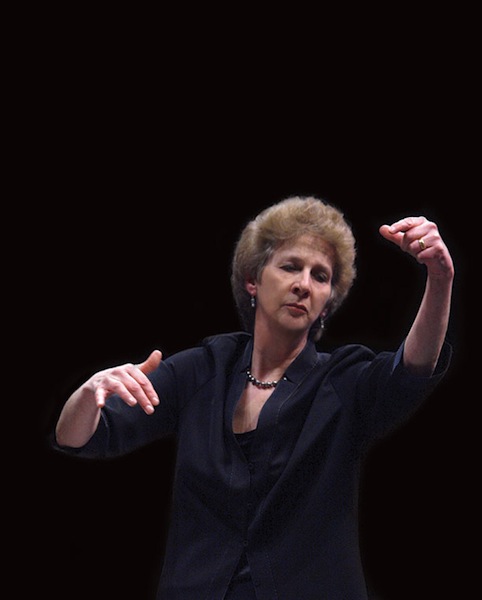Glover leads Music of the Baroque in a vivid, dramatic “St. John Passion”

With John Nelson quietly folding up the tent of his Chicago Bach Project last year, Music of the Baroque once again has the field largely to itself for Easter performances of Bach’s cornerstone religious works.
Bach’s towering trio of large-scale church masterworks are written on such a remarkable level of inspiration that it’s almost a given that no single performance is going to capture all of their variegated elements successfully.
Yet Jane Glover and Music of the Baroque did a superb job of it Monday night with a vivid performance of Bach’s St. John Passion at the Harris Theater.
Bach’s religious works are, in essence, his unwritten operas, and the St. John Passion is the most operatic of Bach’s surviving settings. Glover directed an intense, dramatic performance that conveyed both the spiritual essence as well as boldly putting across the theatrical nature of the piece.
Monday’s performance took a little while to settle. The extraordinary opening music missed the sense of embarking on a strange and mysterious journey. And in the opening chorus (“Herr, unser Herrscher”) hissing sibilants from some of the male choristers suggested a dangerous gas leak.
The performance quickly found its footing. As demonstrated repeatedly over the years of her Chicago tenure, Glover knows how this music should go and her direction was virtually faultless–tempos ideal, pacing and balancing immaculate, the drama always front and center.
Under the direction of William Jon Gray, the MOB Chorus handled their varied roles with polish and amazing versatility—angry and spiteful as the scornful crowd and bringing a warm spiritual expression to the choruses, not least the heart-easing, consolatory glow of “Ruht wohl.”
In an ideal world, a St. John performance should have two bass soloists, and just let Jesus be Jesus. (The same goes for separating the Evangelist and tenor arias as well.) Still, economic considerations being what they are, one can understand why MOB tasked their two lead singers with double duty.
Thomas Cooley was a superb Evangelist. His vibrant tenor encompassed the tortuous demands of this narrator role, with only fleeting pitchy moments and occasional strain in the highest tessitura. Cooley was especially impressive in Part Two, bringing fiery dramatic intensity and expressive feeling to his telling of Jesus’s trial and crucifixion
A little more space around Michael Sumuel’s utterances as Jesus would have added some gravitas, rather than quickly leaping in each time. Yet Sumuel’s rich bass-baritone and stoic poise conveyed the requisite vocal dignity. Having Sumuel do double-duty in the arias also showcased his versatility, the singer strikingly agile in “Eilt ihr angefichten Seelen” and bringing noble expression to “Betrachte, meine Seel.”
Yulia van Doren’s bright-toned, flexible soprano encompassed the spiritual joy of “Ich folge die gleichfalls” as surely as the tragic sobriety of “Zerfliesse, mein Herze.”
The weak link among the soloists was mezzo-soprano Meg Bragle; her thin voice and pallid timbre brought little distinction to “Von den Stricken.” In the climactic “Es ist Vollbracht” (It is finished) Bragle executed the fast middle section with agility but her vocalism was outclassed by the burnished tone and expressive eloquence of Craig Trompeter’s viola da gamba.
Chorus members effectively took on a number of small roles as needed. Keven Keys was a standout as a strongly sung Pilate.
Similarly, in addition to providing flexible and responsive corporate musicianship, several orchestra members shone in their obbligato solos: oboists Anne Bach and Peggy Michel, violinists Gina DiBello and Sharon Polifrone and, especially, flutist Mary Stolper and viola de gambist Trompeter. The continuo playing of Trompeter, organist Michael Beattie and bassoonist William Buchman had a glowing yet precise inevitability that anchored the entire performance.
Paul Agnew conducts Music of the Baroque in vocal music of Handel, Vivaldi and Pergolesi with soprano Sherezade Panthaki and countertenor Jakub Józef Orlinski. Concerts are 7:30 p.m. April 22 at the North Shore Center for the Arts in Skokie and 7:30 p.m. April 23 at the Harris Theater. baroque.org
Posted in Performances




